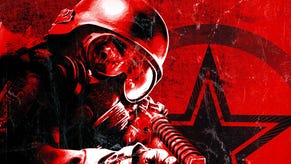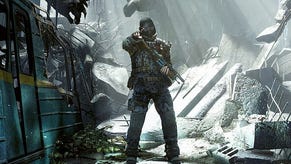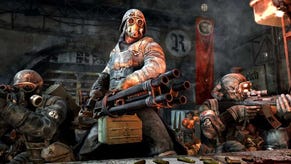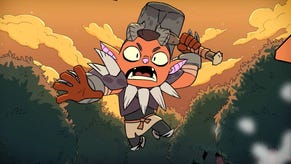Metro: Last Light has earned its mature rating
Metro: Last Light is rife with adult themes. VG247's Dave Cook steps into 4A's brutal post-apocalyptic hell and speaks with the studio about life beyond the brink.
I played three hours of Metro: Last Light recently and I came away feeling dirty. It's a game that doesn't shy away from mature themes, and it certainly doesn't present them in an unrealistic manner.
There's even an attempted rape scene.
At one point I was trudging down a dark tube line towards my next objective. It was deathly quiet, but I could hear a commotion drifting faintly on the breeze. It was echoing from an ancient part of the Metro littered with rusted train cars.
Going off the beaten path I headed towards the sound to see a gang of male raiders cornering a young woman. They were threatening to force themselves on her, so without thinking twice I gunned them all down with my gas-powered rifle.
But there was no XP reward, no HUD marker to tell me what a good job I had done, because this is what gaming has taught us to expect, even during moments of intense pathos. Nothing happened. Instead, the woman curled up in a ball and laid down on the soiled mattress. She started to cry.
I stood around waiting for something to happen, expecting some dialogue to say thank you, or perhaps an escort mission to take her home. Then I realised that these things don't happen in real life, and that's precisely how Metro: Last Light wants you to feel: uncomfortable.
As I walked away from the train car to carry on my mission, I could still hear the woman wailing behind me in the distance, as if it was following protagonist Artyom like a spectre. As the sound eventually faded I started to think about the way 4A Games handled the scene, and about my reaction to what happened.
About an hour before that I had to get to the other side of a city square, and the only way across was through a downed passenger jet. Artyom's comrade Pavel helped me prize open the side door, and we were met with the corroded skeletons of holiday-makers.
If that wasn't grim enough, the pair suddenly became possessed by a strange force that showed them the moments leading up to the crash. Looking out from the cockpit, I saw the pilots shrieking as they tried to steer the plane away from the nuclear blasts below.
Lights on the cockpit controls flashed and droned loudly, as buildings crumbled and collapsed on the streets. Finally, a heatwave surged through the craft vaporising everyone and bringing Artyom back to consciousness. It's clear that Metro: Last Light has earned its mature rating with gusto.
After my session I spoke with Dmitry Glukhovsky, author of the Metro book series. You can read my full interview with him soon, but he told me that the key theme of Last Light is mankind squandering its second chance at a new life, and repeating all of the same mistakes as before.
This feeds into the game's plot, which sees several opposing factions fighting for control of the Metro line while trying to track down the last remaining Dark One. There's even a regimented order called The Reich that bears parallels to the Nazi movement, complete with red insignias and a rigidly militarised hierarchy.
They populate the station below the Bolshoi theatre, where cabaret shows are performed on the hour to the whoops and jeers of drunk soldiers on downtime. The whole experience shows a world where mankind has regressed to worn ideals, immense sexism and a degree of inequality best condemned to history.
It's clear that the residents of the Metro line haven't learned from the terrible mistakes of the past, but developer 4A Games has learned a lot since Metro 2033. Not only are the mature themes displayed with sobriety instead of glorification, the game is a huge leap from a technical and gameplay perspective.
It surpasses its predecessor on all counts. The stealth works this time, and it falls in line with last year's Far Cry 3, giving players multiple routes and options with which to plan each silent attack. Turning off lights and tripping circuit breakers can create shadow, increasing your chances of slipping by unnoticed. It's empowering and smacks of smart environmental design.
The studio has also made its currency system easier to understand. Military-grade bullets are still used as money, but here they are clearly marked so that you don't accidentally use them in battle. You can still use them in your gun of course, but you are prompted before each use just in case.
You still need gas mask filters when venturing outside, and there's few things as tense as hearing your wrist-watch beep miles from the nearest safe area. When this happens you'll be scrambling around like crazy looking for new air filters before you suffocate.
If you don't have enough air, don't go outside. If you want to save your military rounds, use stealth instead. If you get lost, don't expect there to be a mini-map because there isn't one. This is a game that doesn't treat you like a baby, and that's why it's so enjoyable.
Before my hands-on I spoke with Deep Silver's Huw Beynon about Last Light's dark tone and to get a handle on how closely the plot looks at life before World War III. "There are elements of Artyom's past in there," he replied, "as he goes through his own personal journey. But the reasons and the 'why' behind the war are never explained, because this is 'year zero' for the remnants of humanity.
"It's irrelevant who did what. This is the new reality, the new dark age that people are living through and we don't have to dwell on what happened before. It's more about how people are eking out this dark and bleak existence, and somehow trying to - not just live - but thrive, survive and to find some kind of meaning in their life when everything's been blown to s**t."
Metro: Last Light's town hubs depict all of the above, and are fleshed out incredibly this time around. There's a great sense of post-war depression running through each station, as beggars stumble around drunk, families tend to swine, and parents play shadow puppets with their children. It all feels tangible and very, very sad.
I was going to close this article talking about how technically impressive Metro: Last Light has become. The PC version looks next-gen for example, while the console builds squeeze their respective rigs to the limit. It's simply a proficient and accomplished game.
But I want to return to the rape scene instead. As shocking and deplorable as it was, it begs many questions as to the literary and emotional value of titles like this. It's a horrid scene that exists off the beaten path and bears no relevance to the mission structure. Yet it's in there waiting to test the resolve of any gamer who comes across it.
This is a mature game, one that handles difficult themes and questions with care, skirting around the ham-fisted approach employed by other studios out there. It's a reality check that catches you off-guard and is likely to get people talking for some time to come.
Some may condemn it, while others may celebrate 4A's bravery. Either way it should spark debate, but the question remains: Is the industry mature or capable enough to handle such thorny issues properly? Discuss below.
Disclosure: To write this piece Dave attended a Deep Silver showcase day In London. All travel was paid for by VG247. While catering was offered at the event, all food and drink was bought by Dave. No other merchandise or advertising was offered or accepted.














.png?width=291&height=164&fit=crop&quality=80&format=jpg&auto=webp)






